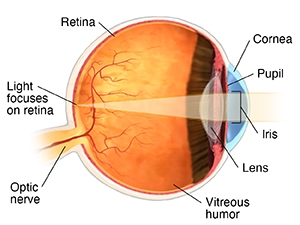Normal Vision
What is normal vision?

To understand how certain problems can affect your child's vision, it’s important to know how normal vision happens. For children with normal vision, the following things happen in this order:
Light enters the eye through the cornea. This is the clear, dome-shaped surface that covers the front of the eye.
From the cornea, the light passes through the pupil. The iris, or the colored part of your eye, controls the amount of light passing through.
From there, it then hits the lens. This is the clear structure inside the eye that focuses light rays onto the retina.
Next, light passes through the vitreous humor. This is the clear, jelly-like substance that fills the center of the eye. It helps to keep the eye round in shape.
Finally, the light reaches the retina. This is the light-sensitive nerve layer that lines the back of the eye.
The optic nerve is then responsible for carrying the signals to the visual cortex of the brain. The visual cortex turns the signals into images.
Connect with us:
Download our App: